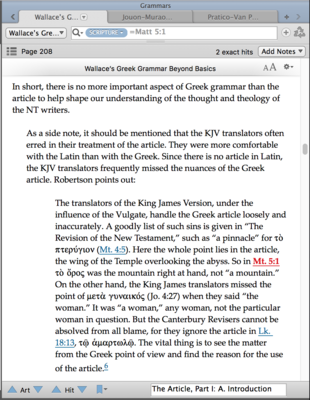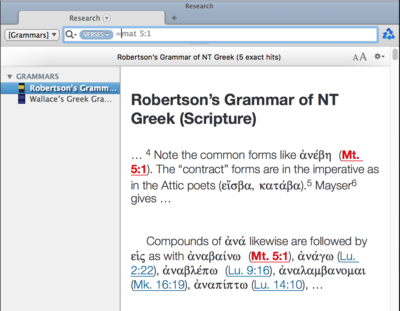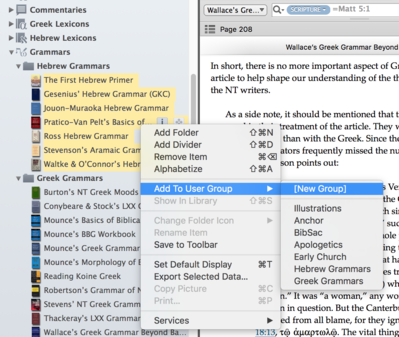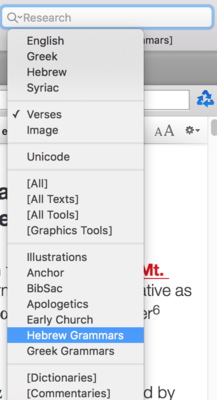In my second year of seminary, years ago, I took a Greek syntax and exegesis course. As one might imagine, this course involved writing a syntax and exegesis paper. We were all required to pick a portion of the New Testament and look at it from every angle. We were encouraged to focus only on a verse or even just a sentence or phrase. That paper had to cover every aspect of our passage including linguistic, text-critical and interpretive (historical and modern) understandings.
We were told to comb through commentaries, journal articles, lexicons, and even grammars. Back then, trying to identify whether a grammar covered a particular passage of Scripture could be difficult—because back then, we didn’t have Accordance! We were dependent upon Scripture indexes in the back of books, and many books—especially grammars—simply didn’t have them. If a grammar was missing a Scripture index, I usually just skipped it. I wasn’t going to visually scan every page to see if my passage was covered. And back then, even if there was a Scripture index, it was prepared by a fallible human being. There was always the possibility that the index was not truly complete.
Accordance gives advantages for this kind of research that simply can’t be matched by print books. With Accordance, every reference work can be searched for any Bible reference. Simply drop down the list in the search field and choose Scripture. Tip: If you’re only wanting a narrowed reference, say Matthew 5:1, place the equals (=) sign in front of it so your search results will only display this verse and not any larger passage that would also include Matthew 5:1.
Click/tap the image above for a larger view.
The ability to search a grammar by verse reference is helpful, but even so, using Accordance’s Research Tool instead will allow you to search through multiple titles at once. Simply set the Research Settings to Verses and Grammars, add your reference to the Research search field (don’t forget the equals sign if necessary) and go! Every occurrence of your focus passage will be highlighted in the results.
Click/tap the image above for a larger view.
You can even create a User Group just for your Hebrew or Greek grammars to save time and search through all of them at once. To do this, you will want to go to the Grammars section of your Accordance Library. Note that I have already created subfolders to separate Hebrew and Greek grammars. Highlight the grammars that you want to include and choose Add to User Group: [New Group] from the contextual menu.
Click/tap the image above for a larger view.
Name your new User Group whatever you like. I named the one in this example, “Hebrew Grammars.” Now, notice that your new User Group will display in the User Groups section of the Research dropdown menu.
Click/tap the image above for a larger view.
So, if I wanted to research my Hebrew Grammars for Genesis 1:2, I would enter in that reference and make certain I selected both Verses and my Hebrew Grammars User Group. After I hit the Enter key, I get a number of Research results.
For instance, in A Grammar of Biblical Hebrew by Jouon and Muraoka, under a section titled “Strong Vocalization,” I find the following statement: “strong vocalisation is particularly frequent when two analogous words are closely6 associated and form a group, e.g. תֹּ֫הוּ וָבֹ֔הוּ Gn 1.2… .” Along with the greater description in this section, this information would be very helpful in the syntax section of a student’s paper.
In Basics of Biblical Hebrew by Practico and Van Pelt, there is commentary on Genesis 1:2 which reads, “‘The first metaphor we meet with in the Bible,’ writes M. G. Kline, ‘likens the Creator–Spirit to a bird hovering over the deep–and–darkness (Gen 1:2).’ In fact, we are confronted throughout Scripture with avian (bird) metaphors for God.” This would be excellent information for the exegesis portion of the paper.
Practically speaking, use of grammars for this kind of research goes well beyond student use. Anyone studying a passage will benefit from discovering how it is treated in a biblical language grammar.
Bonus tip: use this same method for researching Greek or Hebrew words or phrases, too.





